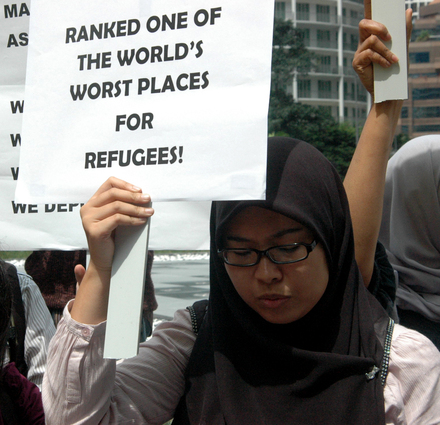Yesterday, Malaysia and Australia, signed the refugee deal. While the reasons for Australia’s minority government wanting this deal are clear, all is not clear on the Malaysian side. It is indeed mind-boggling why the Malaysian government has willingly allowed itself to come under intense and continued scrutiny, exposing the regime’s atrocious human rights record. One theory is that the deal will help fill the ruling regime’s dwindling coffers. Australian budget papers reveal the Malaysian Government will be paid $292 million for its 5 for 1 refugee swap deal. Australia will pay $95,000 per person for the 800 asylum seekers we (Australia) transfer to Malaysia and $54,000 each for the 4000 sent to Australia. It will be interesting to scrutinise who on the Malaysian side will be privy to this largesse.
The jury is still out on how to best address the trafficking of women, children, labour and refugees in this region. New Mandala readers maybe interested in a conference at the University of New England that seeks to address these issues. The abstract of the conference is as follows:
This year marks the 60th anniversary of the landmark 1951 UN Convention on the status of Refugees defining their rights and states’ legal obligation to protect them. The history of the 1951 Convention and the 2005 World Summit (that recognised the responsibility to protect) is a vibrant area of research, exchange of knowledge and ideas. The World Summit was a key milestone in a long list of human rights responsibilities that states have taken on over the last 65 years as the modern human rights regime has developed. Nevertheless, international declarations and norm-making activities often raise as many questions as they answer about the willingness of relevant actors to live up to their responsibilities, as well as potential conflicts between responsibilities. This conference will critically discuss regional processes in the Asia-Pacific region, for example the Bali Process, and examine the wide range of human rights duties and responsibilities accruing to state and non-state actors. It will also explore the case for recognition of available intermediate solutions.
Papers presented by researchers and human rights’ defenders will provide an overview of why refugees and undocumented migrants are considered as a threat in most societies and states’ migration control strategies. They will examine the solutions impasse in the Asia-Pacific region as a whole, South-east Asia, North-east Asia and South Asia. The conference will also lay the foundations for an international research network dedicated to develop┬нing collaborative investigations on the key themes.
A core focus of the Conference will be a com┬нparison of the immigration policies of countries in the Asia-Pacific region over time and investigation of the causes and effects of immigration policies as well as their implementation.
Please contact Professor Amarjit Kaur ([email protected]) for further information.
 Facebook
Facebook  Twitter
Twitter  Soundcloud
Soundcloud  Youtube
Youtube  Rss
Rss 